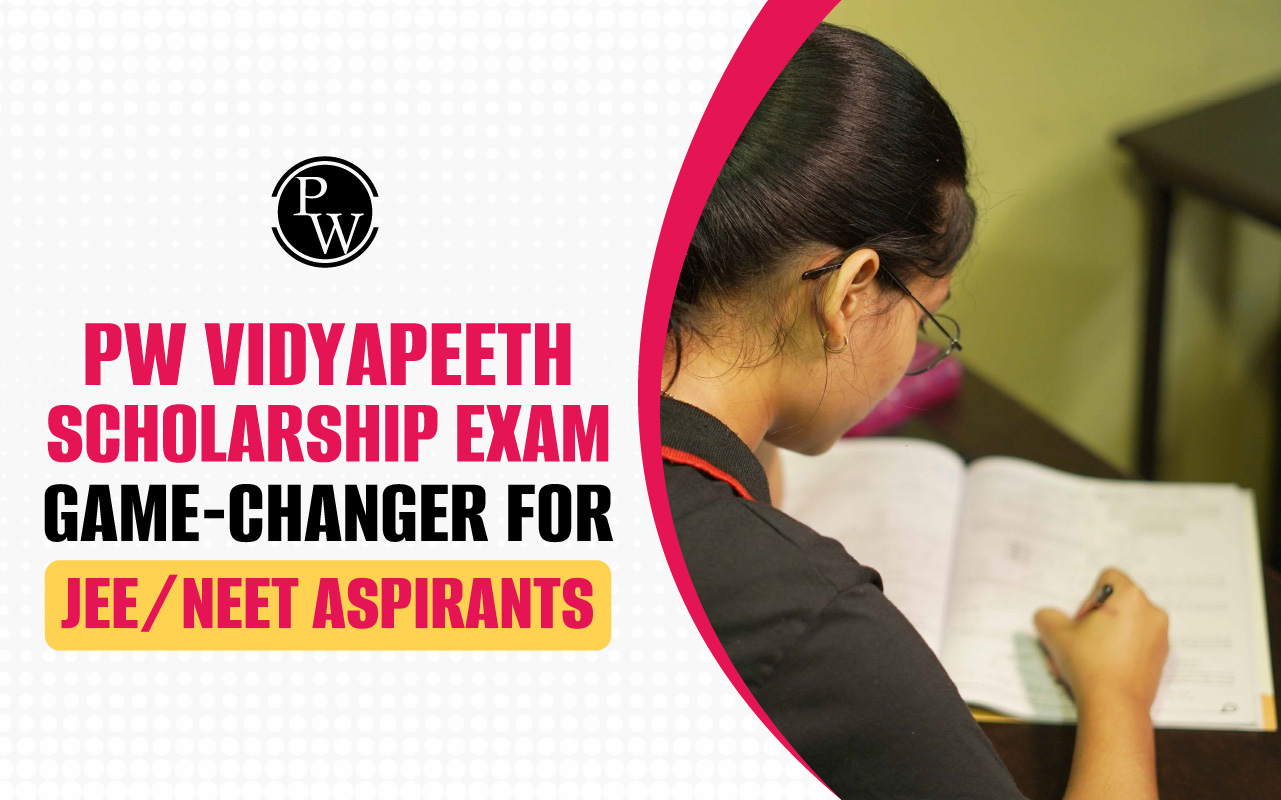

PWNSAT 2025, Things to Do One Week Before the Exam: One week before PWNSAT 2025, focus on systematic revision and practice. Review the complete syllabus, prioritizing NCERT concepts and your handwritten notes. Take multiple mock tests and solve previous years’ question papers to get comfortable with the exam pattern and time management. Analyze your mock test results to identify and address weak areas. Avoid starting new topics; instead, reinforce your understanding of already-studied subjects. Practice mental ability questions to sharpen problem-solving skills.
PWNSAT Modes Overview
PWNSAT (Physics Wallah National Scholarship cum Admission Test) 2025 is a national-level scholarship exam offering up to 100% scholarship on PW courses, the exam is conducted both online and offline.
| PWNSAT Modes Overview | |
| Exam Name | PWNSAT 2025 (Physics Wallah National Scholarship cum Admission Test) |
| Conducting Body | Physics Wallah |
| Exam Mode | Online & Offline |
| Scholarship Amount | Up to 100% on PW courses |
| Registration Fee | None |
| Benefits | Scholarships, access to study materials, experienced faculty, and Vidyapeeth center support |
PWNSAT 2025, Things to Do One Week Before the Exam
Practice mental ability and reasoning questions for sharper problem-solving. Ensure all exam materials are ready, maintain a healthy routine with good sleep, and stay positive for optimal performance on exam day. One week before PWNSAT 2025, focus on systematic revision and mock practice. Review the entire syllabus, emphasizing NCERT concepts and your own notes. Take multiple mock tests and solve previous years’ question papers to get familiar with the exam pattern and improve time management. Analyze your mistakes in these mocks to identify and strengthen weak areas. Avoid starting new topics; instead, consolidate what you already know. Her’s a detailed guide for the mandatory things to be followed before one week of PWNSAT.
Revise the Entire Syllabus
Dedicate the week to a thorough revision of the entire PWNSAT syllabus. Systematically go through each subject—Mathematics, Physics, Chemistry, Biology, and Mental Ability—using your notes and textbooks. Prioritize chapters you find challenging and revisit key formulas, definitions, and concepts. Make use of summary sheets or mind maps for quick recall. Ensure you are familiar with the exam pattern and the types of questions asked. Allocate specific time slots for each subject to cover all topics without feeling overwhelmed. A comprehensive revision ensures you don’t miss out on any important areas and boosts your overall confidence for the exam.
Focus on NCERT Concepts
The PWNSAT syllabus is strictly based on NCERT chapters, making it essential to master every concept from these textbooks. Carefully read through each chapter, paying attention to solved examples, in-text questions, and exercises. Highlight important points and clarify any doubts immediately. For science subjects, understand the underlying principles rather than just memorizing facts. For mathematics, practice NCERT problems repeatedly to strengthen your foundation. Reviewing NCERT content ensures you are well-prepared for the types of questions likely to appear in the exam and prevents surprises on test day.
Practice with Mock Tests and Previous Year Papers
Attempting full-length mock tests and solving previous years’ PWNSAT papers is crucial in the final week. Simulate real exam conditions by timing yourself and avoiding distractions. This helps you get accustomed to the exam pattern, manage time effectively, and build exam temperament. After each mock, analyze your performance to identify mistakes and areas needing improvement. Focus on accuracy and speed, as both are vital for a competitive edge. Regular practice with mocks and past papers also reduces anxiety and increases your confidence for the actual exam.
Analyze and Improve Weak Areas
Use the results from your mock tests and practice sessions to pinpoint your weak areas. Make a list of topics or question types where you consistently lose marks. Devote extra time to revising these sections, clearing up any conceptual gaps with the help of teachers, peers, or online resources. Practice additional questions from these topics to build confidence. Don’t ignore your weaknesses; addressing them head-on can make a significant difference in your overall score. This targeted approach ensures balanced preparation and minimizes the risk of underperforming in any section.
Avoid New Topics
Resist the temptation to start new topics in the final week before the exam. Introducing unfamiliar material at this stage can lead to confusion and unnecessary stress. Instead, focus on consolidating what you have already studied. Revise familiar topics, reinforce your strengths, and ensure you can recall key concepts and formulas quickly. This strategy helps maintain your confidence and ensures you perform well on questions from areas you have already mastered. Trust your preparation and avoid overloading your mind with new information at the last minute.
Strengthen Mental Ability and Reasoning
Dedicate time each day to practicing mental ability and reasoning questions, as these are integral to the PWNSAT exam. Work on puzzles, logical reasoning sets, and data interpretation problems to sharpen your analytical thinking. Practice quick calculations and shortcut methods to save time during the test. Review common question patterns and develop strategies for tackling tricky problems. Consistent practice in this area not only boosts your score but also enhances your overall problem-solving skills, which are valuable across all subjects.
Organize Study Materials and Notes
Ensure all your study materials, notes, and revision sheets are well-organized and easily accessible. Arrange your notes by subject and topic for efficient last-minute revision. Keep important formulas, theorems, and key points in a separate notebook or flashcards for quick reference. Having everything in order reduces stress and saves valuable time during the final days. If you have digital notes, back them up and keep your devices charged. An organized study environment contributes to a focused and productive revision routine.
Maintain a Healthy Routine
Adopt a balanced routine during the final week, prioritizing both study and self-care. Get adequate sleep each night to aid memory retention and maintain focus. Eat nutritious meals to keep your energy levels up and avoid junk food that can cause fatigue. Take short breaks between study sessions to relax your mind and prevent burnout. Engage in light physical activity or meditation to reduce stress. A healthy routine ensures you remain physically and mentally fit, which is essential for peak performance on exam day.
Prepare Exam Day Essentials
A few days before the exam, gather all necessary materials such as your admit card, valid ID proof, pens, pencils, and a water bottle. If the exam is offline, know your exam center location and plan your route in advance. For online exams, ensure your device, internet connection, and backup power are reliable. Set out your clothes and pack your bag the night before. Double-check the reporting time and any specific instructions from the exam authorities. Being well-prepared logistically helps you stay calm and focused on the exam itself.
Stay Positive and Confident
Maintain a positive mindset throughout the final week. Remind yourself of the hard work you’ve put in and trust your preparation. Avoid comparing yourself to others or stressing over minor setbacks. Practice relaxation techniques such as deep breathing or visualization to manage anxiety. Surround yourself with supportive friends and family who encourage you. Confidence is key to performing well—believe in your abilities, approach the exam with a calm mind, and give your best effort without fear of failure.
| Also Check |
| JEE 2025 Inorganic Chemistry Roadmap |
| IIT JEE Offline Coaching Fees and Scholarships |
| JEE Dropper Preparation Strategies |
| How to score high in JEE Chemistry Paper? |
PWNSAT 2025, Things to Do One Week Before the Exam FAQs
What is PWNSAT?
What are the exam modes available for PWNSAT 2025?
Can I change my exam mode after registration?
Are there any registration fees for PWNSAT?













